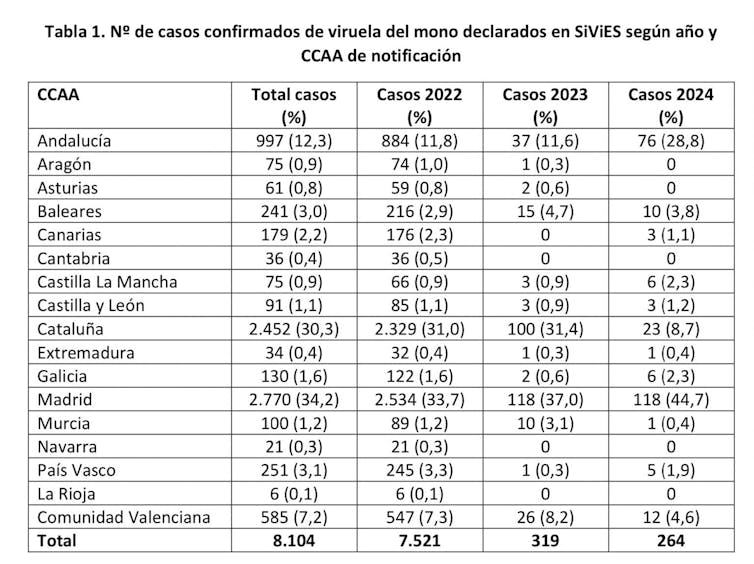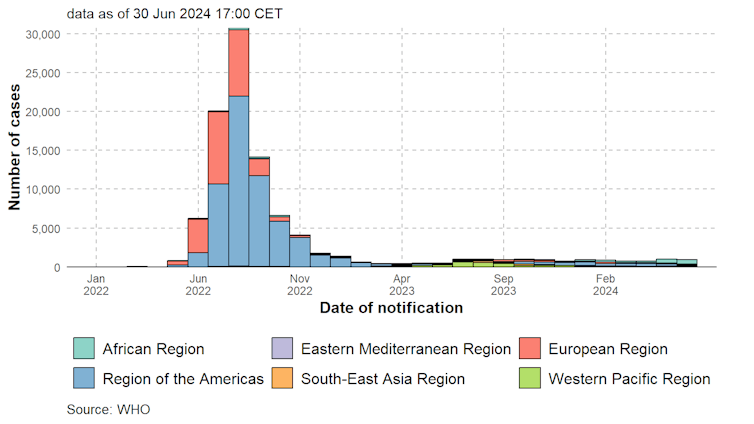19/08/2024
Published in
The Conversation
Ignacio López Goñi
Full Professor of Microbiology
In 2022, quite unexpectedly, the largest outbreak of mpox (as monkeypox is now universally recommended by the World Health Organization) occurred outside the African continent with nearly 100 000 cases, including 208 deaths in 116 countries.
The disease was caused by the subject II virus and was transmitted mainly through sexual contact . Spain, together with the USA and Brazil, was one of the countries with the highest issue number of cases (more than 8,000 cases and 3 deaths).
The World Health Organization declared an international health emergency. Early diagnosis, awareness-raising and partnership with the most affected groups, vaccination of those infected and their contacts, and the use of antivirals in the most severe cases made it possible to control the epidemic.
One virus, two lineages
There are two genetically distinct lineages (groups or clades) of this virus: clade I, which until now was found in Central Africa, and clade II, in West Africa.
Clade I had been reported in the past to be associated with more severe clinical symptoms and higher mortality of up to 3% compared to clade II. These lineages are further subdivided into subclades Ia and Ib, and IIa and IIb, respectively. The 2022 epidemic was caused by the less severe clade IIb.
What is happening now in Africa
During this year 2024, the Democratic Republic of Congo has reported more than 16,000 cases of mpox that have claimed more than 500 lives. In all cases, the virus clade I was the causative agent .
The majority of reported infections and deaths are among children under 15 years of age (66% of all cases and 82% of all deaths). This is the largest outbreak of this type in Africa to date.
In recent months, spread has been confirmed in several neighboring countries and similar cases have been detected in Burundi, Central African Republic, Congo, Rwanda, Uganda and Kenya.
Person-to-person transmission occurs through close physical contact contact . It can be face to face, talking or breathing in close proximity, through droplets that are excreted. But also by contact with the skin, mouth to mouth or mouth to skin. On final, the transmission of this virus is both sexual and non-sexual. It can even occur through contaminated material such as clothing, towels or blankets.
Mpox can infect all age groups, but data shows that clade Ia is more prevalent in children and adolescents, while clade Ib is found mainly in adults and is associated with sexual transmission.
A serious public health problem
The greater severity of clade I (compared to clade II that caused the 2022 epidemic), its spread in several African countries and the fact that it is affecting children and adolescents is a serious public health problem and cause for concern. This is the reason why the World Health Organization has, for the second time, re-declared mpox as an international health emergency.
It should be noted that the social, economic and epidemiological status and health systems in Africa are very different from those in Europe. To date, there are still significant uncertainties about the main transmission routes, transmissibility and severity of the two types of viruses (clades I and II), as well as the consequences that may occur in Africa and the rest of the world. Transmissibility, disease severity and mortality rate of a virus also depend on the environment.
Possibility of more cases in Europe, but low risk for general population
One case of mpox of the Ib clade has already been reported in the European Union, and more imported cases are likely to occur. It is therefore important that European countries are prepared to handle them and prevent secondary transmission.
According to the ECDC, the overall risk to the general population of the European Union is currently considered low, based on a very low probability leave and an equally low impact.
Evidently, the risk of infection increases if you travel to affected countries and have close contact with affected communities contact . However, for the general population, the severity of disease is expected to be leave. However, the risk of severe disease is increased in those infected with other underlying conditions, particularly in immunocompromised individuals.
It is time for vigilance...
To detect cases and prevent secondary transmission, among other measures, the ECDC recommends raising awareness among health care professionals about the possibility of mpox infection associated with travel to affected countries; ensuring effective surveillance ( laboratory and epidemiological testing); promptly isolating any suspected cases until proven negative and, if positive, until symptoms resolve; implement contact tracing and testing of close contacts of confirmed cases; provide travel advice and vaccinations to people visiting or returning from countries with confirmed outbreaks; continue risk communication activities and work with civil society organizations to engage the population.
... and solidarity
The declaration of an international health emergency is a call for solidarity. The best way to control an outbreak of this subject is to act at the source and as soon as possible. Resources (diagnosis, treatment and prevention, vaccines) must now be devoted to African countries, not to closing borders.
In most cases the disease is mild, we know the virus, we know how it is transmitted, we have vaccines and antivirals, it seems that having passed the infection or vaccination protects for life. It is time to remember that feat of which we were the protagonists: the Royal Philanthropic Vaccine Expedition, which carried the smallpox vaccine across the American continent to the Philippines and helped to eradicate the disease.
Do you remember that alarmist headline about the Californian strain of SARS-CoV-2 announcing "The devil is already here"? Does anyone remember what happened with that strain? Hopefully at this point politicians will not use a disease as a weapon and the media will be able to report truthfully and rigorously.


